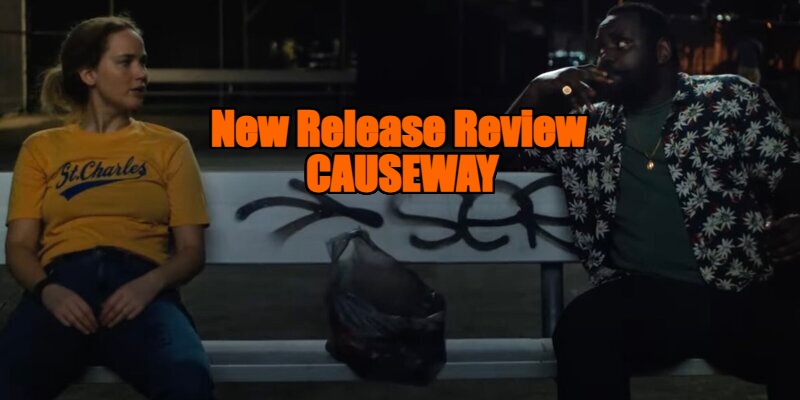
Review by
Eric Hillis
Directed by: Lila Neugebauer
Starring: Jennifer Lawrence, Brian Tyree Henry, Linda
Emond, Jayne Houdyshell, Stephen McKinley Henderson

One of the most over-employed visual clichés in American cinema is that of
a troubled female protagonist submerging themselves in water. Watch any
American movie about a damaged woman and it's more likely than not that at
some point she'll duck her head below the water line of a bath or spend a
few seconds longer than is safe in the deep end of a swimming pool. In the
past this might have been dismissed as a sly way of coaxing some nudity
from a leading lady, a square on the male gaze bingo card, but in the past
few years we've seen women filmmakers carry on the trope.

Acclaimed stage director Lila Neugebauer takes this cliché a step
further with her film debut Causeway. Her damaged female protagonist wants to spend so much time in the water
that she takes a job as a pool cleaner so that she can submerge herself on
a daily basis. Played by Jennifer Lawrence in a return to the sort
of low key indie fare that kicked off her career, Lynsey is a soldier who
received a brain injury when she was caught up in an explosion in
Afghanistan (to continue the water metaphor, her specific role was in the
building of a dam). The film opens with a sequence that sees her return to
the US and begin her physical rehabilitation with the aid of kindly older
nurse Sharon (Jayne Houdyshell), to whom she is often unwittingly
cruel. This opening segment is the film's most engaging portion, and I
would have gladly watched Lynsey and Sharon's burgeoning relationship for
an entire movie.
But we quickly jump ahead in time to the point where Lynsey has been
deemed fit to leave Sharon's care and return home. Lynsey can now walk and
drive and even work as a pool cleaner, but sometimes the messages from her
brain to her hands get lost in the mail and she drops things. Lynsey moves
back in with her mother (Linda Emond), but does her best to keep
out of her way to avoid arguments regarding her desire to return to
Afghanistan. Instead Lynsey spends most of her time in the company of
local garage owner James (Brian Tyree Henry). Like Lynsey, James is
damaged both psychologically and physically, having lost a leg in a car
accident that has left him with even worse emotional injuries. The movie's
title references the location of James' accident, but also suggests the
path to recovery Lynsey finds herself on, one that must be treaded
carefully, one stone at a time.

It's rare that we get to see men and women simply hanging out together in
movies, so it's frustrating that even after Lynsey's declaration of her
lesbian leaning, Causeway insists on a "will they, won’t
they?" narrative. Despite the charming and tender performances of Lawrence
and Henry, the movie doesn't seem to know how to portray a man and a woman
as merely two platonic friends providing support for one another. When
Lynsey tells James that she's only interested in women, we think we're in
for something a little different. But even if James gets and accepts the
message, the movie doesn't.
On multiple levels it's a surprisingly conservative film. There's a moment
that suggests Lynsey's lesbianism can be interrupted by maternal feelings
when she snogs the sad-eyed James because she "feels sorry for him."
Visiting her addict brother in prison, Lynsey is told by her sibling that
prison is the best place for him as it keeps him away from drugs, which
might be the most ridiculous statement I've ever seen conveyed with a
straight face. Similarly suggesting that the military is the best place
for troubled people, it's difficult not to view Causeway as
a piece of US government propaganda. Lynsey's goal is to get back to her
role in her country's illegal invasion of Afghanistan, and those who
object do so out of worry for Lynsey rather than for the Afghans whose
suffering she might contribute to. Unlike Jon Voight's wounded vet in Hal
Ashby's
Coming Home, Lynsey never remotely lays the blame for her troubles at the door of
the military. Causeway is such a right wing mirror to
Coming Home that it might as well be called Going Back.
While the film posits the interesting notion that America isn't the best
place for working class people to deal with their various issues,
left-leaning viewers will struggle with its claim that prison and the
military offer better alternatives.

It wouldn't take much tweaking of the script to turn
Causeway into the sort of mega-church-funded movie that
might star Gina Carano in the role of Lynsey (ironically,
Coming Home star Voight would probably feature in a role
given his conservative heel turn). It's an unquestioning tribute to the
resilience of the troops, and if you can't see it as propaganda you might
ask yourself how you would feel about a Russian movie centred on a wounded
soldier whose sole motivation is to return to Ukraine?

Causeway is on Apple TV+ now.

